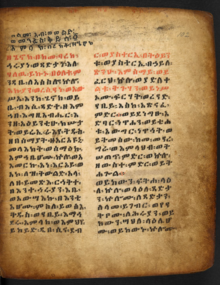
Back 1 Henog Afrikaans መጽሐፈ ሄኖክ Amharic سفر أخنوخ Arabic Kentañ levr Enoc'h Breton Llibre d'Henoc Catalan 1. kniha Henochova Czech Første Enoksbog Danish Äthiopisches Henochbuch German Libro de Ĥanoĥ Esperanto Libro de Enoc Spanish

 | |||||
| Tanakh (Judaism) | |||||
|---|---|---|---|---|---|
|
|
|||||
| Old Testament (Christianity) | |||||
|
|
|||||
| Bible portal | |||||
The Book of Enoch (also 1 Enoch;[a] Hebrew: סֵפֶר חֲנוֹךְ, Sēfer Ḥănōḵ; Ge'ez: መጽሐፈ ሄኖክ, Maṣḥafa Hēnok) is an ancient Jewish apocalyptic religious text, ascribed by tradition to the patriarch Enoch who was the father of Methuselah and the great-grandfather of Noah.[1][2] The Book of Enoch contains unique material on the origins of demons and Nephilim, why some angels fell from heaven, an explanation of why the Genesis flood was morally necessary, and a prophetic exposition of the thousand-year reign of the Messiah. Three books are traditionally attributed to Enoch, including the distinct works 2 Enoch and 3 Enoch. None of the three are considered to be canonical scripture by most Jewish or Christian church bodies.
The older sections of 1 Enoch are estimated to date from about 300–200 BC, and the latest part (Book of Parables) is probably from around 100 BC.[3] Scholars believe Enoch was originally written in either Aramaic or Hebrew, the languages first used for Jewish texts. Ephraim Isaac suggests that the Book of Enoch, like the Book of Daniel, was composed partially in Aramaic and partially in Hebrew.[4]: 6 No Hebrew version is known to have survived. Copies of the earlier sections of 1 Enoch were preserved in Aramaic among the Dead Sea Scrolls in the Qumran Caves.[2]
Authors of the New Testament were also familiar with some content of the book.[5] A short section of 1 Enoch is cited in the New Testament Epistle of Jude, Jude 1:14–15, and attributed there to "Enoch the Seventh from Adam" (1 Enoch 60:8), although this section of 1 Enoch is a midrash on Deuteronomy 33:2, which was written long after the supposed time of Enoch. The full Book of Enoch only survives in its entirety in Ge'ez (Ethiopic) translation. It is part of the biblical canon used by the Ethiopian Jewish community Beta Israel, as well as the Christian Ethiopian Orthodox Tewahedo Church and Eritrean Orthodox Tewahedo Church. Other Jewish and Christian groups regard it as non-canonical or non-inspired, but may accept it as having historical or theological interest.
Cite error: There are <ref group=lower-alpha> tags or {{efn}} templates on this page, but the references will not show without a {{reflist|group=lower-alpha}} template or {{notelist}} template (see the help page).
- ^ Barker (2005).
- ^ a b Barker, Margaret. (2005) [1998]. The Lost Prophet: The Book of Enoch and Its Influence on Christianity. London: SPCK; Sheffield Phoenix Press. ISBN 978-1-905048-18-2
- ^ Fahlbusch, E.; Bromiley, G.W. The Encyclopedia of Christianity: P–Sh page 411, ISBN 0-8028-2416-1 (2004)
- ^ Cite error: The named reference
Isaacwas invoked but never defined (see the help page). - ^ Cheyne and Black, Encyclopaedia Biblica (1899), "Apocalyptic Literature" (column 220). "The Book of Enoch as translated into Ethiopic belongs to the last two centuries BC. All of the writers of the NT were familiar with it and were more or less influenced by it in thought"